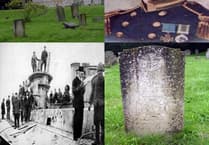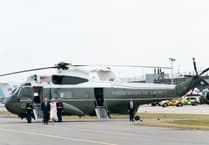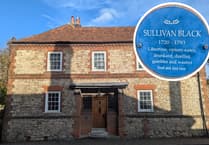The closest most of us get to Peking these days is by ordering a crispy duck from the Chinese takeaway. But at the turn of the last century, a local man’s heroic efforts 5,000 miles from home was rewarded with one of the military’s highest honours: the Victoria Cross.
General Sir Lewis Stratford Tollemache Halliday, born in the East Hampshire village of Medstead in 1870, was a captain in the Royal Marine Light Infantry serving in the Legation Quarter of Peking during the Boxer Rebellion, a violent anti-foreigner and anti-Christian uprising in China at the turn of the 20th century.
At that time, Peking was the imperial capital of China under the Qing Dynasty. However, parts of the city, particularly the Legation Quarter, operated under extraterritorial arrangements granted to foreign powers. This gave foreign nationals certain privileges and protections, effectively exempting them from Chinese law within those zones.
The Boxer Rebellion was, in part, a reaction against these foreign encroachments - spearheaded by the Yihetuan, a secret society that believed in mystical powers to protect them from bullets and nicknamed ‘Boxers’ by the British because of their use of Chinese martial arts.
Their campaign escalated into attacks on foreign nationals, missionaries, and Chinese Christians, culminating in a siege of the diplomatic quarter in Peking, where foreign legations and their families were trapped for weeks.
On June 24, 1900, the British Legation faced one of its fiercest assaults. The Boxers, bolstered by Qing Imperial troops, set fire to stables and took control of nearby buildings.
Halliday, commanding 20 men, led a daring counterattack to reclaim the area - breaking through a wall into the enemy-held buildings, where intense hand-to-hand combat erupted.
In the chaos, Halliday was shot at point-blank range, shattering his left shoulder and blowing away part of his lung. Remarkably, he still managed to kill three attackers with his revolver before ordering his men to press on without him and staggering back alone to the legation’s hospital.
For his actions, Halliday was awarded the Victoria Cross, the highest award for gallantry in the British and Commonwealth forces, receiving his medal from King Edward VII during an investiture at Marlborough House in July 1901.
His citation in the London Gazette reads: “On the 24th June, 1900, the enemy, consisting of Boxers and Imperial troops, made a fierce attack on the west wall of the British Legation, setting fire to the West Gate of the south stable quarters, and taking cover in the buildings which adjoined the wall.
“As the presence of the enemy in the adjoining buildings was a grave danger to the Legation, a sortie was organised to drive them out.
“A hole was made in the Legation Wall, and Captain Halliday, in command of twenty Marines, led the way into the buildings and almost immediately engaged a party of the enemy. Before he could use his revolver, however, he was shot through the left shoulder, at point blank range, the bullet fracturing the shoulder and carrying away part of the lung.
“Notwithstanding the extremely severe nature of his wound, Captain Halliday killed three of his assailants, and telling his men to ‘carry on and not mind him’, walked back unaided to the hospital, refusing escort and aid so as not to diminish the number of men engaged in the sortie.”
Halliday’s gallantry at Peking came early in a long and distinguished military career. After recovering from his wounds, he returned to active service, commanding marine detachments aboard HMS Galatea and HMS Empress of India, the flagship of the Home Fleet.
He later held prestigious positions, including commanding officer at the Royal Military College, Sandhurst, where one of his cadets was the future Field Marshal Earl Alexander of Tunis.
Halliday retired as a general in 1930 and died in 1966, aged 95, laid to rest at St Andrew’s Church, Medstead. Today, Halliday’s Victoria Cross is displayed at the Royal Marines Museum in Southsea.




